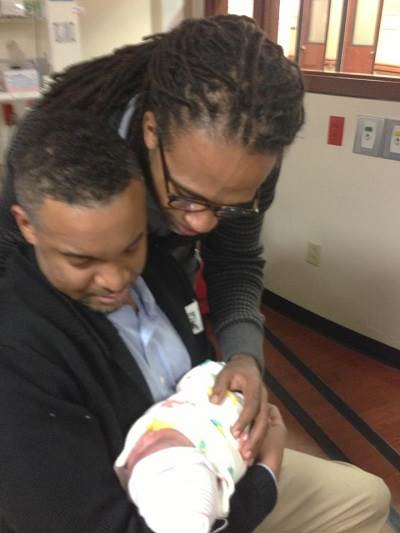DADS???
http://www.thagospel.com/2013/01/congrats-to-bishop-oc-and-first.html
Congrats To Bishop O.C. and First Gentlemen On The New Arrival
The Vision Cathedral of Atlanta just got a new member this morning. Congrats to Bishop Oliver Clyde Allen,III and First Gentlemen Rashad Burgess on the new arrival of their new bundle of joy ‘Caylee LaTanya Burgess-Allen.’
Message from the Family:
“We are proud to announce the birth of a healthy 8.1 lbs. baby, born Thursday January 10, 2013 at 8:23am. The surprise is that it’s a little girl! Her name is, Caylee LaTanya Burgess-Allen. She’s so precious and we love how she has already brought such meaning to our lives. We are humbled and grateful to have such loving and supportive grandparents, godparents, family, a loving Church, faith community, coworkers and beautiful friends who are committed to us.
Please pray for us as we love little Caylee and support us as we expand our family and complete the adoption process.
“Welcome home our Princess, little Caylee”
Your Dads.
OH BOY
An Arizona physical education teacher was arrested Wednesday after a former student accused her of inappropriate sexual conduct dating back eight years.
Nicole Wooten, 36, is charged with three counts of sexual conduct with a minor. Tempe police spokesman Sgt. Mike Pooley told independent Phoenix news station KTVK that the victim, a female, “decided to come forward” and speak to detectives.
The incidents allegedly occurred in 2005 and 2006, when the victim was about 12 years old and in eighth grade, per the Arizona Republic.
According to SexLaws.org, there is no statute of limitations in Arizona for sexual conduct with a minor under age 15, molestation of a child or continuous sexual abuse of a child, which is defined as “three or more incidents of abuse.”
ABC Phoenix reported that the alleged incidents included inappropriate touching and occurred at Wooten’s residence in Mesa, Ariz. A school spokeswoman said that no incidents happened at the school itself.
Police said Wooten admitted to the allegations in an interview following her arrest. Authorities said the accused woman was placed on unpaid leave Thursday.
Wooten began working at the Herrera School for the Fine Arts and Dual Language, a Phoenix elementary school, in 2000.
Huffington Post
WTF AFRICA- HUSBAND SHOTS WIFE IN THE REAR
The story is that of a strange love, such that is uncommon. For anyone that heard of a man shooting his wife in the course of a quarrel, the reaction would be that such an act should be punished.
But it sounds strange to hear that the woman would still profess love for such a person or even plead for him at the police station, despite sustaining injuries from the shot fired by the husband for whom she was carrying a second child.
That was the drama that played out between a couple recently at Apete community, Ibadan. The husband, Wasiu Waheed (35), reportedly had a quarrel with his wife and when he saw that he could not silence his wife’s caustic tongue, he decided to use a weapon that would have silenced the woman forever, save for providence.
Being a security guard, Waheed possessed a barrel gun and he did not hesitate before picking the gun which he allegedly aimed at his wife, Kafayat. Immediately she saw her husband with the gun, the woman knew she was in trouble and attempted to escape. However, her legs could not move fast enough as the pellets from the gun hit her on the buttocks and back.
Though not apprehended when the incident occurred, policemen at Apete nabbed Waheed recently when he had another case at the police station. To the consternation of all, Kafayat pleaded with the police to, please, leave her husband as there would be nobody to take care of her and her only child if he should be detained. She also defended her husband’s action as something over which he had no control.
Speaking on what led to the quarrel which almost cost his wife her life, Waheed, an Ibadan indigene from Ayeye Patako Quarters, said: “The incident happened on December 15, 2012. I am a security guard. I came from work that day. The gun I took to work did not fire when I pulled the trigger, so when I got home , I tried to remove the already loaded pellets and the gunpowder from it.
“My wife went to buy oranges which she was selling and came back between 7.30a.m. and 8a.m. that day. I was inside sleeping. She came to ask for money for breakfast. I reminded her that there was elubo and little stew at home. I told her to wait until I had taken some rest but she went on making noise outside. I woke up and took the gun to remove the pellets so that I could discharge the gunpowder.
“I held the gun and was working on the gun. She came back from the toilet and still continued to rant. There was an iron rod that I used to solidify the gunpowder inside the gun. I was using it when she came and started struggling with me. In the process, the gun fell. I wanted to pick the gun but my hand mistakenly pulled the trigger and the gun went off. I did not even know that she was hit by pellets because she ran away.
“Shortly after, my father who lives within our community, sent people to call me. He was the one who told me that I had shot my wife and that she had blood stains on her buttocks. Later, a man in our community asked her to report my action at the police station. The police took her to a hospital at Apete but they said they could not take care of her.
“Later, we took her to a traditional doctor where the pellets were extracted locally . She recovered quickly after that and had continued with her business.
“I was arrested recently when a man I apprehended for moving late in the night reported at Apete station that I assaulted him. that was how the police said that I was a wanted man in the case of an attempted murder. I told them, however, that I was not on the run, and I had been living with my wife after the incident. It is not rational that I would just pick a gun and shoot my wife.”
The wife, Kafayat Rasak, who gave her age as 25 years initially declined to speak with Crime Reports. When she eventually spoke, she tried to speak along the line of her husband’s narration, but when it was pointed out to her that some of the things she said were contradicting one another, she opened up on what transpired between her and her husband on the fateful day.
According to her, “It is true we had a quarrel but I believe that his action was not ordinary. That was not our first time of quarrelling and he had always had a gun which he never used on me until that day. What happened was that he threw my things out when we quarrelled.
“My properties were outside for about two weeks and some things got missing. I went to him and asked him to find those things. When I saw that he got up from where he was, I ran out but the next thing I felt was pain as pellets from his gun penetrated my buttocks and back. But we have since settled everything and the wound has healed.”
A police source told Crime Reports that when the incident occurred in December last year, it was the wife who came to the police station to report. The source added that all efforts to locate the man proved abortive as he was alleged to have absconded from home. But the man, it was said, used to come home at night to eat, enjoy conjugal relationship with his wife and sleep.
The source further stated that they had to arrest the man when a case of assault was reported against him on February 11, because signal on the initial case had been sent to the command headquarters and there was an order that he should be arrested whenever found.
Crime Reports gathered that Kafayat, who could not stand her husband’s arrest and detention, boldly walked into the office of a senior officer to plead for the release of her husband, saying that she could not bear to see him suffer in detention or taken to prison. The noticeably-pregnant woman told the police that she was not ready to pursue the case.
However, the Deputy Commissioner of Police in Oyo State, Mr Clement Adoda, told Crime Reports that the case was still pending before the police, stating that the offence was not against the woman but the state.
A BIBLICAL VIEW OF HOPE- GOOD MORNING
A Biblical View of Hope
A Biblical Look at “Hope”
In order to properly understand the Christian’s hope, it is important to examine the exact meaning of the word “hope.” “Hope” means “a desire for, or an expectation of, good, especially when there is some confidence of fulfillment.” It is used that way both in common English and in the Bible. However, the Bible often uses the word “hope” in another way—to refer to the special expectation of good that God has in store for each Christian in the future. This includes the “Rapture,” receiving a new, glorified body, and living forever in Paradise. Today, the ordinary use of “hope” allows for the possibility that what is hoped for will not come to pass. [1] However, when the Bible uses the word “hope” to refer to things that God has promised, the meaning of “hope” shifts from that which has a reasonable chance of coming to pass to that which will absolutely come to pass. To be a useful anchor, hope must hold fast.
A biblical occurrence of “hope” as “an expectation of good” can be found in Acts 27:20. Paul was on a ship bound for Rome. A storm came up and raged for many days, such that “we gave up all hope of being saved.” Another example is in 3 John 14 where the Apostle John wrote to his friend Gaius, and said, “I hope to see you soon, and we will talk face to face.” These are examples of the Bible using the word “hope” in the way it is used in everyday language, such as when someone says, “I hope it rains this week,” or “I hope you feel better.” There are also many biblical examples of the word “hope” referring to everlasting life and the blessings associated with it. Colossians 1:23 mentions “the hope held out in the gospel,” i.e., “the expectation of future good presented in the gospel.”
It is unfortunate that the word “hope” has come to be used in common English as a synonym for “wish.” In the sentence, “I hope it will rain this week,” the word “hope,” if properly used, implies a certainty or confidence that it will, in fact, rain. If there is no such confidence, then it would be more proper to say, “I wish it would rain this week.”
As noted above, when the Bible uses the word “hope” in reference to events in the future, there is no doubt at all that the events will occur. The book of Titus contains a usage of “hope” referring to the believer’s expectation of eternal life:
Titus 1:1 and 2
(1) Paul, a servant of God and an apostle of Jesus Christ for the faith of God’s elect and the knowledge of the truth that leads to godliness—
(2) a faith and knowledge resting on the hope of eternal life, which God, who does not lie, promised before the beginning of time.
This is a good example of the word “hope” referring to our expectation of everlasting life. In this case, it implies more than just a desire or a wish. It is an expectation of the future that will absolutely come to pass. God, “who does not lie,” made many promises about the future everlasting life of the believer. Although we may not know when He will fulfill those promises, we can be absolutely certain that He will fulfill them.
The Anchor of the Soul
The Bible has a great deal to say about the future life in Paradise that saved people will enjoy. God speaks about the future for a reason: He wants each and every Christian to make up his mind to obey Him and to be committed to Him in good times and in bad times. History and experience both show that it is difficult to make and keep a Christian commitment. Many people commit to the Lord for a while, but then, for various reasons, abandon their commitment. Many once-dedicated Christians have stopped praying, reading the Bible, fellowshipping with other Christians, etc., for all sorts of reasons. God speaks about the future to provide hope so that believers will have an anchor for their souls; an anchor to hold them steadfast to Him. Hebrews 6:19 says, “We have this hope as an anchor for the soul, firm and secure.”
God’s use of the anchor to represent the believer’s Hope is appropriate and poignant. An anchor keeps a boat from drifting away with the currents or being blown away in a storm. Thus, using an anchor to describe the purpose of the Christian hope makes perfect sense. When a Christian has a clear picture of what he is hoping for in the future, especially the rewards that the Lord will give to those who have earned them, it helps to keep him from “drifting away” from his commitment and becoming involved with the sinful pleasures and abundant temptations offered by the world. It also helps to prevent him from being “blown away” from God during the storms of life.
Because the Hope was referred to as an “anchor,” the anchor was the earliest known Christian symbol. It was used to represent the Hope of resurrection unto everlasting life. At Pompeii, the Roman city buried by lava in 79 AD when Mt. Vesuvius erupted, a ring was discovered with a beautiful image of an anchor and the Greek word elpis, “hope,” inscribed on it. [2] Some of the earliest Christian graves have an anchor carved into the rock next to them. [3] Christians today use a cross as their common symbol, but there is no reference to the cross being a revered Christian image until after the Roman Empire became Christian. The cross was so abhorred as an instrument of torture that no early Christians venerated it. Historically, the first interest in the image of the cross came after Queen Helena, the mother of the Roman Emperor Constantine, reportedly found the “true cross” on her trip to Israel in 326 AD. [4] Before that time, the anchor was the symbol that the early Christians used to show their hope of resurrection and a wonderful, everlasting future. [5]
The Psychological Value of Hope
The Adversary has made a concerted attack on the subject of the Hope because of the value that it has to anchor people to godliness and truth. One of the reasons the Hope is an anchor for the Christian life is that hope energizes people and gives them strength to endure in a way that nothing else does. People without hope become defeated, broken, and unable to cope with adversity. Hopeless people give up. If Christians are going to stay energized and motivated to do the work of the Lord day in and day out, putting up with all the trouble that the Devil and people put them through, it is vital to have a hope that is real, alive, and vivid.
The strengthening and energizing value of hope shows up in many ways in everyday life. When a mother tells her hungry family that dinner will be ready in ten minutes, she gets a totally different response than if she says she does not know when it will be ready. The hope of eating soon gives the family the energy to hold on a little longer. Having hope is vital in the medical field. Modern medicine acknowledges the healing value of hope because hopeful people have more strength and endurance. A mother will tell a sick child that the medicine will make him feel better “soon” because that helps the child stay positive and endure the pain.
Having a hope in the form of a visible goal is also important in athletic performance. Every coach knows the value of yelling “Last lap!” to the runner or swimmer whose muscles are already screaming from fatigue. Hearing “One more lap!” causes the athlete to reach deep and find the energy to push through to the end. Runners, skiers, skaters, rowers, and other athletes know that muscles that seem to be just holding on somehow come to life and have extra strength when the finish line comes into sight. The Hope that the race will soon be over infuses the body with energy that seems to come from nowhere. There is no question that having hope anchors a person to his goal and gives him energy and strength to go on.
Just as hope energizes and strengthens, it is also true that being without hope drains one’s strength. The feeling of being “hopeless” is devastating. A person with no hope, with no expectation of good, often sinks into depression and despair and may even commit suicide. The effects of being hopeless are well documented. People who have no hope of everlasting life grieve over death in ways that Christians who are confident of everlasting life do not. Paul wrote to the Thessalonians and told them that the dead Christians would be raised to life when Christ comes “down from heaven, with a loud command, with the voice of the archangel, and the trumpet call of God” (1 Thess. 4:16). Paul knew that when they really had hope in the raising of the dead, they would not “grieve like the rest of men, who have no hope” (1 Thess. 4:13).
Christian work can be difficult. It is often under-financed and under-appreciated, many times involving endless hours of work in poor conditions for unthankful people. Furthermore, Christians are still human, and so, although it should not be this way, Christian work is often accompanied by envy and jealousy, power struggles, distrust, personal agendas, cliques, backbiting, and other less than desirable things. Why would anyone work—often on a volunteer basis—in those conditions? One answer is that many people start out being very idealistic, but idealism usually does not last long in the “real” world. Without a vivid hope to sustain them, they eventually burn out. Having a vivid hope, however, gives people strength and energy to press on. The mistreatment and lack of appreciation can be dealt with when one realizes that there will be rewards that he or she will receive at the Judgment. Paul wrote about this very thing:
1 Corinthians 15:58
Therefore, my dear brothers, stand firm. Let nothing move you. Always give yourselves fully to the work of the Lord, because you know that your labor in the Lord is not in vain.
Unfortunately, too many Christians do not “know” that their “labor in the Lord is not in vain.” Many have been taught that salvation is the “be all, end all” for the Christian. They have not been taught that an important part of their hope is the rewards they will receive for their work in this life. Thus, as they look around and see other “saved” Christians doing much less work, they lose their energy and strength and become discouraged. If these people really knew the rewards their efforts were earning, they would have the strength to go on. Because accurately teaching the Hope has the effect of strengthening and invigorating Christians, the Adversary has launched a powerful attack on it. To date, the attack has been very successful. Nevertheless, the scriptures concerning the Hope stand clear. It is therefore the purpose of this book to present those scriptures so that Christians will become knowledgeable of the Hope and benefit from the application of that knowledge, for truly, a vital hope is the anchor of the soul.
****RULES**** 1. Debates and rebuttals are allowed but disrespectful curse-outs will prompt immediate BAN 2. Children are never to be discussed in a negative way 3. Personal information eg. workplace, status, home address are never to be posted in comments. 4. All are welcome but please exercise discretion when posting your comments , do not say anything about someone you wouldnt like to be said about you. 5. Do not deliberately LIE on someone here or send in any information based on your own personal vendetta. 6. If your picture was taken from a prio site eg. fimiyaad etc and posted on JMG, you cannot request its removal. 7. If you dont like this forum, please do not whine and wear us out, do yourself the favor of closing the screen- Thanks! . To send in a story send your email to :- [email protected]







Recent Comments